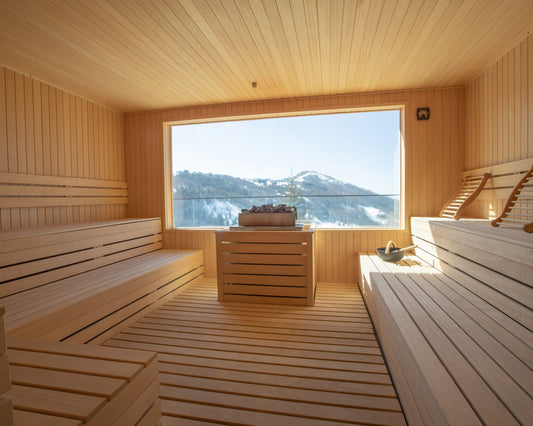Indoor Saunas
A Perfect Sauna For Any Room In Your Home

Enhance your home sauna experience
Health & Wellness
Exploring the health benefits of using an indoor sauna reveals its potential to significantly enhance relaxation and detoxification, bolster the immune system, and overall improve health.
- Ideal Temperature 70 C - 100 C
- Pour Water Over Sauna Stones To Increase Humidity In Your Sauna Room
- Add Essential Oils In The Water for Aromatherapy Experience In Sauna
- Wear Very Little Or No Clothing To Release Toxins From Your Body While In Sauna
With our Wi-Fi enabled remote controlled electric sauna heaters have your outdoor sauna ready to go with the touch of a button right from your phone.
Our outdoor saunas arrive in pre-fabricated easy to assemble panels. Everything you need to build your outdoor sauna is delivered right to your door!

Advantages of Pre-Fab Indoor Sauna
Portable Indoor Sauna
- Compact & Functional Sauna Rooms
- Easily Moved, Ideal For Basement Or Garage
- Made From Quality Canadian Red Cedar
- Easy To Setup & Install
- Great For Small Spaces
- Accommodates Various Electric Sauna Heaters
Frequently Asked Questions About Indoor Saunas
Learn More About Indoor Saunas For Your Home
How to Choose the Best Indoor Sauna?
When selecting the best indoor sauna there are several key factors to consider:
Size and Space: Measure the available space in your home to determine the appropriate size for the sauna. Consider how many people will typically use it at once and ensure there is enough room for comfortable seating.
Heating Method: An Electric heater are the best, most convenient, and easiest to control. We have lots of great heater options here.
Material and Construction: Look for saunas made from durable materials like cedar. Cedar is known for their resistance to heat and moisture, which are crucial in sauna environments. Pay attention to the craftsmanship and construction to ensure it's sturdy and well-built.
Ventilation: Proper ventilation ensures air circulation and prevents mold or mildew growth. Choose a sauna with adequate ventilation features, such as adjustable air vents.
Installation and Assembly: Different types of indoor saunas require different installation and assembly procedures. For instance, if you possess handy skills, you can easily put together prefabricated models using basic tools. However, custom saunas should be installed only by a professional. We're always ready to assist you, so feel free to contact us today to ensure your indoor sauna is installed correctly, or to discuss your specific requirements. For the electrical requirements, a professional electrician will be needed.
Additional Features: Think about any additional features you may want, such as built-in speakers for music, LED lighting, or ergonomic benches. While these features are not essential, they can enhance your sauna experience.
Warranty and Customer Support: Check the warranty and customer support offered by the manufacturer. A reliable warranty gives you peace of mind and ensures that you're protected in case of any defects or issues with the sauna.
Budget: When purchasing a sauna, it is important to set a budget and explore options within that price range. Keep in mind that higher-priced saunas may offer better quality and durability, but there are also budget-friendly options available.
By considering these factors and
thoroughly researching different indoor sauna options, you can choose the best one to enjoy the relaxation and health benefits of sauna therapy in the comfort
of your home. Shop custom saunas here.
Benefits of an Indoor Sauna
Indoor saunas are similar to outdoor saunas and offer many advantages beyond just relaxation.
The convenience of access to your indoor sauna right in the comfort of your home space is such a wonderful, relaxing experience. Indoor saunas as an addition to your home gym create the ideal home wellness retreat. forget going to the spa when you can unwind and relax right from the warm comfort of your own home!
Traditional saunas have so many amazing benefits. They help reduce muscle strain and stress, encourage deep relaxation, and improve sleep quality.
Sauna therapy can improve heart rate, increase blood circulation, and lower blood pressure. Furthermore, sweat helps detoxify and purify the skin. Indoor saunas can help relieve congestion and facilitate breathing.
Indoor saunas offer a range of health and wellness benefits, making them a popular addition to many homes. Here are some of the key benefits:
- Relaxation and Stress Relief: Saunas provide a tranquil environment that promotes relaxation. The heat helps relax muscles, relieve tension, and reduce stress levels, leading to calm and well-being.
- Detoxification: Sweating in a sauna helps to eliminate toxins and impurities from the body through the skin. This natural detoxification process can support overall health and well-being by cleansing the body of harmful substances.
- Improved Circulation: The heat from the sauna causes blood vessels to dilate, improving circulation. This increased blood flow delivers more oxygen and nutrients to tissues and organs, promoting better overall health.
- Pain Relief: Sauna therapy can help alleviate muscle and joint pain associated with conditions such as arthritis, fibromyalgia, and muscle strains. The heat soothes sore muscles, reduces inflammation, and promotes faster recovery after exercise or injury.
- Skin Health: Sweating in a sauna opens up pores and helps to remove dead skin cells, resulting in clearer, healthier-looking skin. Regular sauna use can also improve skin tone, texture, and elasticity, reducing the appearance of wrinkles and blemishes.
- Immune System Support: Sauna sessions can stimulate the immune system by increasing white blood cell production and activating the body's natural defense mechanisms. This can help the body fight off infections and illnesses more effectively.
- Respiratory Benefits: The steam and heat in a sauna can help open airways and alleviate symptoms of respiratory conditions such as congestion, asthma, and bronchitis. Sauna therapy may improve breathing and promote lung health over time.
- Mental Clarity and Relaxation: Regular sauna sessions can improve mental clarity, focus, and cognitive function by reducing stress and promoting relaxation. Many people find that sauna therapy helps them feel more alert, energized, and mentally refreshed.
Incorporating sauna sessions into your routine can provide numerous physical and mental health benefits, enhancing your overall quality of life and well-being.
Is it safe to have a sauna in your house?
Traditional indoor saunas can be safe for home use when installed and used properly. Here are some safety feature considerations and other tips:
- Proper Ventilation: A sauna must have proper ventilation systems in place to prevent excess heat, humidity, and carbon dioxide buildup. This can be achieved by installing simple cedar vent slides/grills in the upper and lower corners of the sauna that allow for the circulation of fresh air.
- Temperature Control: Traditional saunas can reach high temperatures, so it's essential to have control over the temperature settings. Ensure your sauna has a reliable thermostat or temperature control mechanism to maintain a comfortable and safe temperature level.
- Timer and Shut-off Mechanisms: Saunas should have built-in timers or shut-off mechanisms to prevent overheating and ensure that sessions do not exceed recommended durations. This helps prevent the risk of dehydration, overheating, or other heat-related issues.
- Hydration: Encourage adequate hydration before, during, and after sauna sessions. It is recommended to drink sufficient amounts of water to replenish the fluids lost from sweating and to avoid dehydration.
- Medical Considerations: It is important to consult a healthcare professional before using a sauna, especially if you have underlying health conditions or concerns. Sauna use may not be suitable for everyone, particularly individuals with cardiovascular issues, pregnancy, or certain medical conditions.
- Supervision: If you're new to sauna use or if children will be using the sauna, consider supervising sessions to ensure safety and proper usage.
- Maintenance: Regular maintenance and inspection of your sauna are essential to ensure safety. Check for any signs of wear and tear, malfunctioning equipment, or electrical issues, and address them promptly.
- Clear Instructions: Ensure that everyone using the sauna understands how to operate it safely and knows any guidelines or precautions to follow.
By following these safety precautions and guidelines, you can enjoy the benefits of a home sauna in the comfort of your home safely.
Why Traditional Sauna Is Better Than An Infrared Sauna?
The superiority of traditional saunas over infrared saunas depends on individual preferences, health considerations, and desired sauna experience. However, traditional saunas offer several advantages over infrared that some people may find appealing:
Deep Penetration of Heat: Finish saunas use heated rocks or stoves to produce dry heat, penetrating deep into the body, promoting relaxation, muscle relief, and detoxification. The temperature inside a traditional sauna can reach higher temperatures, typically between 70°C to 100°C (158°F to 212°F), creating a more intense sweating experience.
Humidity Control: Traditional saunas provide a dry heat environment, allowing users to control the humidity level by adding water to the sauna rocks or stove. This flexibility enables users to customize their sauna experience based on personal preferences.
Cultural and Traditional Experience: Many people appreciate the cultural ancient tradition, and historical significance of traditional saunas, which have been used for centuries in various cultures around the world. Traditional saunas offer a sense of connection to these cultural practices and rituals.
Social Aspect: Traditional saunas often accommodate multiple users (up to six people each) versus a one person sauna. They are conducive to socializing and relaxing with friends or family members. The communal aspect of traditional saunas can enhance the overall sauna experience and promote social bonding.
Heat Therapy Benefits: Traditional saunas' intense heat can provide a range of therapeutic benefits, including improved circulation, pain relief, stress reduction, and immune system support. Some users find that traditional saunas offer a more profound and holistic sauna experience than infrared saunas.
It's important to note that both traditional and modern saunas, such as infrared saunas, have unique benefits, and the choice between them ultimately depends on individual preferences, health considerations, and desired sauna experience.
Some people may prefer the gentle, radiant heat of infrared saunas, while others may prefer the intense, dry heat of traditional saunas. Ultimately, the best sauna for you is the one that meets your needs and preferences while also being used safely and responsibly.
Can I Put A Sauna In My Basement?
A basement is a great place for an indoor home sauna. We have installed many basement saunas, including both prefab and custom-built saunas. Contact us for more.
Can I Put a Sauna In My Bathroom?
Sure! If the bathroom is large enough to accommodate a home sauna, it can be done! See our Instagram page for inspiration on some of our home sauna builds.
Do indoor Home Saunas Need To Be Vented?
Yes, a sauna must have proper ventilation systems in place to prevent excess heat, humidity, and carbon dioxide buildup. This can be achieved by installing simple cedar vent slides/grills in the upper and lower corners of the sauna that allow for the circulation of fresh air. No external exhaust is required.
Do Indoor Saunas Use A Lot Of Electricity?
The electricity consumption of indoor saunas can vary depending on several factors, including the size of the sauna, the heating method used, the duration and frequency of use, and the efficiency of the sauna's design. Here are some considerations regarding electricity usage:
Heating Method: The type of heating method used in the sauna can significantly impact electricity consumption. Electric saunas typically use heating elements to generate heat, while wood-fired saunas rely on burning wood for heat. Electric saunas may consume more electricity compared to wood-fired saunas, especially if they are not energy-efficient.
Size and Insulation: Larger saunas require more energy to heat up than smaller ones. Additionally, besides sauna size, the level of insulation in the sauna plays a significant role in retaining heat and reducing energy consumption. Well-insulated saunas can help maintain a consistent temperature with less energy usage.
Temperature and Duration: The temperature setting and duration of sauna sessions also affect electricity consumption. Higher temperatures and longer sessions will require more energy to maintain. However, it's worth noting that saunas are generally used for short periods, typically 30 minutes to an hour, which can help mitigate electricity costs.
Energy Efficiency: Some modern saunas are designed with energy-saving features such as insulated walls, efficient heating elements, and programmable timers to optimize energy usage. Choosing an energy-efficient sauna model can help reduce electricity consumption and lower operating costs over time.
Usage Patterns: How often the sauna is used and for how long can impact overall electricity consumption. If the sauna is used frequently, it will contribute more to your electricity bill compared to occasional usage.
While indoor saunas do consume electricity, the actual amount can vary depending on these factors. It's a good idea to research energy-efficient sauna models, consider your usage patterns, and be mindful of energy-saving practices to minimize electricity consumption and operating costs.
Are home saunas worth it?
Whether a home sauna is worth it depends on various factors, including your budget, lifestyle, health goals, and personal preferences. Here are some considerations to help you decide:
Health Benefits: Saunas offer numerous health benefits, including relaxation, stress relief, improved circulation, muscle relaxation, detoxification, and potential immune system support. If you value these benefits and believe they align with your health goals, a home sauna could be worth it for you.
Convenience and Accessibility: Having a sauna at home provides convenient access to sauna therapy whenever you want it, without the need to travel to a gym, spa, or public sauna facility. This convenience can save time and make incorporating sauna sessions into your routine easier.
Privacy: Home saunas offer the privacy and comfort of using the sauna in your living space alone, without sharing it with strangers. A home sauna may be more appealing than public facilities if you prefer privacy and solitude during sauna sessions.
Long-Term Cost Savings: While the initial investment in a home sauna can be significant, it may save you money in the long run compared to frequent visits to commercial saunas or spa facilities. Over time, the cost of owning a home sauna may be offset by the savings from not paying for memberships or individual sauna sessions.
Property Value: A well-designed and professionally installed home sauna can add value to your property and enhance its appeal to potential buyers if you ever decide to sell your home in the future.
Customization: With a home sauna, you have the freedom to customize the design, size, safety features, and heating method to suit your preferences and space requirements. You can create a sauna experience tailored to your specific needs and aesthetic preferences.
Social and Family Benefits: Home saunas provide an opportunity for socializing and relaxation with family and friends. Sauna sessions can become a shared activity that promotes bonding and quality time together.
However, it's essential to consider the upfront costs, ongoing maintenance, and operating expenses associated with owning a home sauna. Additionally, if you have specific health concerns or medical conditions, it's advisable to consult with a healthcare professional before investing in a sauna to ensure it's safe and suitable for you. Ultimately, whether a home sauna is worth it depends on your individual circumstances and priorities.
What Is The Difference Between An Indoor Sauna And An Outdoor Sauna?
The primary difference between an indoor sauna and an outdoor sauna lies in their location and construction, which can impact various aspects of their use and maintenance. Here are some key differences:
Location: The most obvious distinction is where the sauna is situated. Indoor saunas are installed inside a building, typically within a home, garage, basement, or dedicated sauna room. Outdoor saunas, on the other hand, are located outside the main structure, often in a backyard, garden, or patio area.
Construction and Materials: Indoor saunas are designed and constructed to withstand indoor conditions, including temperature fluctuations, humidity levels, and ventilation requirements. They are often built with materials such as cedar, hemlock, or basswood, which are suitable for indoor use and provide insulation against heat and moisture. Outdoor saunas require additional weatherproofing and insulation to protect them from the elements, such as rain, snow, wind, and extreme temperatures. They may be constructed with more durable materials like redwood or treated lumber and may have additional features like weatherproof seals and roofing.
Ventilation and Air Circulation: Indoor saunas require proper ventilation systems to ensure adequate air circulation and prevent the buildup of humidity, mold, and mildew. Ventilation may include air vents, windows, or exhaust fans. Outdoor saunas also need ventilation but may have different considerations due to outdoor air quality and temperature variations.
Privacy and Accessibility: Indoor saunas offer the privacy and convenience of being located within your home, making them easily accessible for regular use. Outdoor saunas may offer a more natural and scenic setting but may require walking outside to reach them, which can be less convenient in inclement weather or colder climates.
Installation and Maintenance: Installing an indoor sauna may require modifications to your home's interior, such as electrical wiring, flooring, and ventilation systems. Outdoor saunas require site preparation, such as leveling the ground, providing a sturdy foundation, and ensuring proper drainage. Maintenance requirements for both types of saunas include regular cleaning, inspections, and repairs to ensure safety and performance.
Ultimately, the choice between an indoor sauna and an outdoor sauna depends on your preferences, available space, climate, and budget. Both types of saunas offer unique benefits and considerations, so it's essential to carefully evaluate your needs and priorities before making a decision.
Shop Sauna Accessories
-
Traditional Sauna Cedar Sand Timer
Regular price $39.99Regular priceUnit price / per -
HUUM Stones for Electric Sauna Heater 15kg (5-10cm)
Regular price $73.00Regular priceUnit price / per -
Traditional Cedar Sauna Thermometer - Round
Regular price $43.99Regular priceUnit price / per -
Traditional Sauna Cedar Backrest
Regular price $68.99Regular priceUnit price / per
Blog posts
View all-

Transform Your Backyard With An Outdoor Sauna -...
Are you wondering if an outdoor sauna is right for you? This article will explore the practical considerations and indulgent reasons for bringing the sauna experience to your own backyard,...
Transform Your Backyard With An Outdoor Sauna -...
Are you wondering if an outdoor sauna is right for you? This article will explore the practical considerations and indulgent reasons for bringing the sauna experience to your own backyard,...
-

Discover the Best Sauna From Canada for Your Home
Considering a sauna from Canada? Discover how to enhance your home with Canada’s finest saunas, offering unmatched quality and diverse designs. This article provides insight into the best indoor and...
Discover the Best Sauna From Canada for Your Home
Considering a sauna from Canada? Discover how to enhance your home with Canada’s finest saunas, offering unmatched quality and diverse designs. This article provides insight into the best indoor and...
-

Sauna Wood Stove Pros and Cons
Explore the pros and cons of a sauna wood stove, including safety tips, maintenance, and installation guidelines for an ideal sauna experience.
Sauna Wood Stove Pros and Cons
Explore the pros and cons of a sauna wood stove, including safety tips, maintenance, and installation guidelines for an ideal sauna experience.







